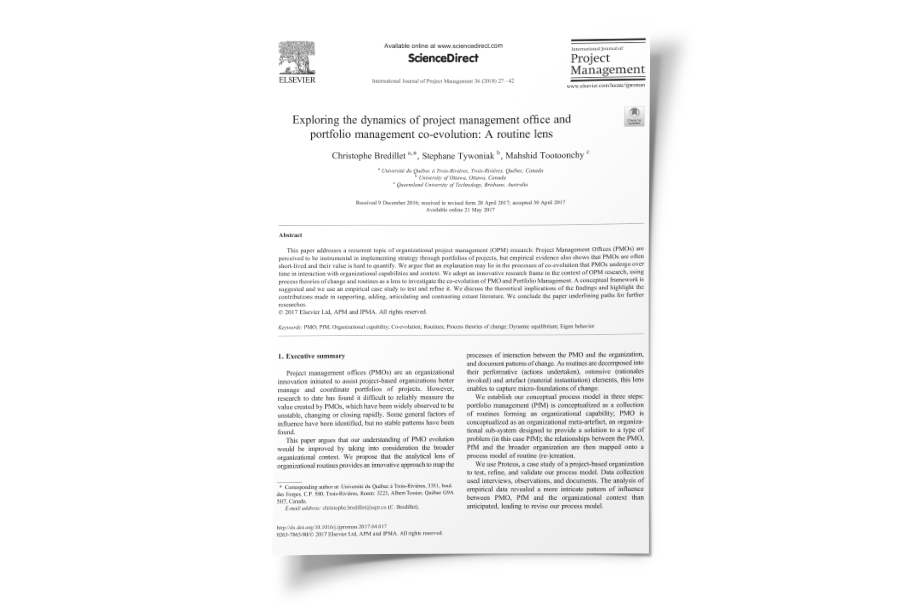Abstract
This paper addresses a recurrent topic of organizational project management (OPM) research: Project Management Offices (PMOs) are perceived to be instrumental in implementing strategy through portfolios of projects, but empirical evidence also shows that PMOs are often short-lived and their value is hard to quantify. We argue that an explanation may lie in the processes of co-evolution that PMOs undergo over time in interaction with organizational capabilities and context. We adopt an innovative research frame in the context of OPM research, using process theories of change and routines as a lens to investigate the co-evolution of PMO and Portfolio Management. A conceptual framework is suggested and we use an empirical case study to test and refine it. We discuss the theoretical implications of the findings and highlight the contributions made in supporting, adding, articulating and contrasting extant literature. We conclude the paper underlining paths for further researches.
Potential Industry Impact
- The analyses can be used as a benchmarking tool. Benchmarking is a relevant way to develop absorptive organisational capacity and learn from other organisations. Different PMO-PfM typologies’ patterns can be compared to investigate how different PMOs work. The benchmarking can be done in three ways: investigating the PMOs in different organisations in the same industry to unveil the best practices, comparing PMOs in the same organisation in different business units or different levels, and investigating cross industry PMOs in the different organisation to shed light om possible transfer of best practices from one organisation to the other.
- The framework can help the decision makers to impulse necessary intentional change to the system. Running the simulation of PMO-PfM relations leads to different scenarios of co-transformation. Therefore, it is possible for the top-level management to realize how the PMO-PfM system can transform or how the transformation might happen. By providing feedbacks when there is a possible problem in the projects, the PMO head can provide possible solutions by initiating a change in the structures or processes.
- This bottom-up approach can help the PMO head to realize the possible consequences of initiating a change at PfM and PMO structures or processes. The decision makers have also to be cautious in initiating intended change as some possible unintended consequences may affect the whole system. In addition, one must keep in mind that the consequences of a change are not immediate, any change spreads over time. Decision makers may use the approach to simulate the possible outcomes and consequences of their intervention.
Academic Impact
- The findings of our exploratory case studies show the importance of managing projects’ knowledge and the lessons learned database. Former research also mentions the role of PMO in developing and maintaining projects’ historical archives (Dai & Wells, 2004), managing the projects’ knowledge (Desouza & Evaristo, 2006), developing projects’ historical data (Kwak & Dai, 2000) and implementing the projects’ information system (Hobbs & Aubry, 2007).
- Although projects have a temporal nature (Lundin & Söderholm, 1995), routinising the way that projects are carried out helps the organisation to evolve their book of procedure. The micro foundation of routines gives us the opportunity to study how PMOs organise for the portfolios of projects.
- Organisations must support the collective problem solving as a particular stance. Producing the output is not enough; problem solving organisations need to create a condition to maintain a pattern of cooperation, create a common understanding of the problem, identify the tasks for groups and define how the problem are addressed (Moguel, Tchounikine, & Tricot, 2012). PMOs are able to articulate and monitor the process of work and reconsider the roles of individuals. Therefore, a PMO can act as a problem-solving organisation.

Authors:
Christophe Bredillet, Stephane Tywoniak, Mahshid Tootoonchy
Journal:
International Journal of Project Management, Volume 36, Issue 1 (January, 2018)
Read:
https://doi.org/10.1016/j.ijproman.2017.04.017

